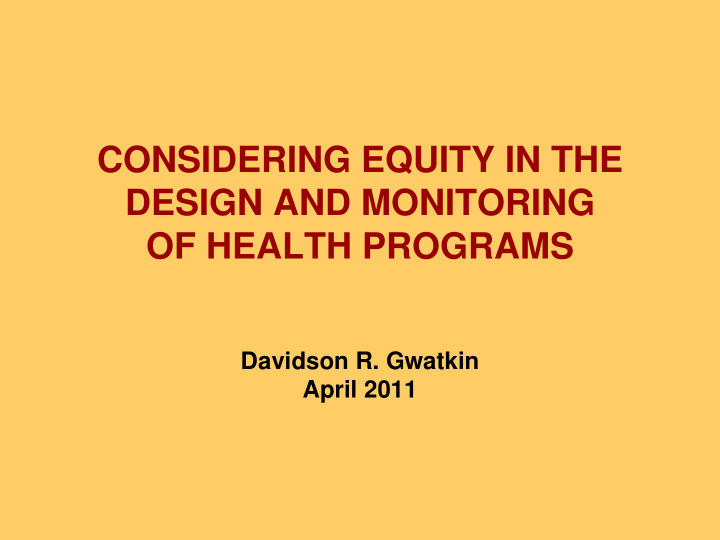



CONSIDERING EQUITY IN THE DESIGN AND MONITORING OF HEALTH PROGRAMS Davidson R. Gwatkin April 2011
THREE PARTS • CONCLUSION • AVAILABLE TECHNIQUES • AN ILLUSTRATIVE PROCESS
Part I CONCLUSION It’s More Promising: • to Focus on Designing a Process to Fit Techniques to Individual Country Settings, • than to Focus on the Techniques Themselves An Illustration: • the Perennial Debate over User Fees
Part II AVAILABLE TECHNIQUES The Problem of Performance Variability across Countries
An Illustration: TARGETING ACCURACY Number Project Performance Type of Targeting (% of Benefits Going to of Method Projects Poorest 40% of People) Worst Best Median 25% of 25% of Project Projects Projects Means Testing 26 <46% 62% >78% Geographic 33 <43% 53% >63% Source : David Coady, Margaret Grosh, John Hoddinott, Targeting of Transfers in Developing Countries: A Review of Lessons and Experience. Washington: The World Bank and International Food Policy Research Institute, 2004
Part III AN ILLUSTRATIVE PROCESS A FIVE-STEP ITERATIVE PROCEDURE
STEP ONE Set Targets in Terms of the Poor Popu- lation Group of Concern. For Example: • Increase Immunization Coverage by 25% in the Poorest 20% of Children • Eliminate Disparities in Attended Delivery Coverage by Raising the Rate among Women below the Poverty Line to that of Women Above the Line
STEP TWO Help People with a Full Understanding of Country Conditions Select a Set of Potentially Pro-Poor Interventions, Based on Such Things as: • Analyses of the Record and Potential of Current Interventions, and of Suggested Alternatives • Knowledge of What Has Worked in Other Countries
STEP THREE Introduce the Selected Interventions in a Large Representative Area, through a Delivery System Typical of that Available in Other Parts of the Country
STEP FOUR Assess/Monitor How Well the Selected Interventions Reach the Poor Population Group of Interest
GHANA: DISTRIBUTION OF PURCHASERS OF CONDOMS SOLD THROUGH THE SOCIAL MARKETING PROGRAM 80 % of Total Purchasers 60 40 20 0 Poorest Three Fourth Least Poor Together Economic Quintile of the Population
KENYA: DISTRIBUTION OF RECIPIENTS OF MEASLES IMMUNIZATIONS THROUGH A MASS CAMPAIGN 30 % of Total Immunization Recipients 25 20 15 10 5 0 Poorest Second Middle Fourth Least Poor Economic Quintile of the Population
BRAZIL: COVERAGE OF SUBSIDIZED DELIVERIES 100 % of Deliveries Subsidized 80 60 40 20 0 Poorest Second Middle Fourth Least Poor Economic Quintile of the Population
STEP FIVE If: • The Intervention Approaches Are Working Well, Expand Their Use • Otherwise: ─ Introduce Mid-Course Corrections, or ─ Drop Them and Try Something Else
THANK YOU!
Recommend
More recommend